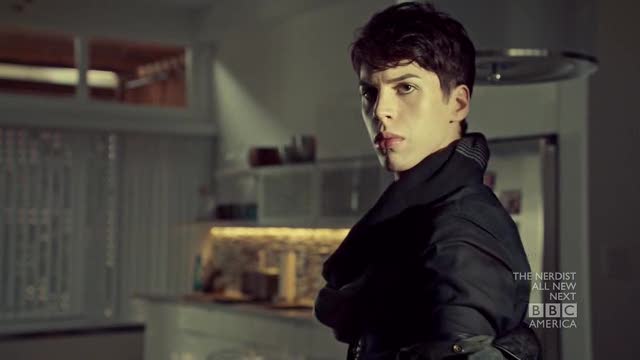 At the end of Pam Rosenthal’s 2008 regency romance novel The Edge of Impropriety, we learn offhand that Lady Isobel Wyatt and Miss Amory, two wealthy young women who had been seeking husbands during the season, have “determined to live together as companions and had set themselves up in a Welsh cottage.” The information is about minor characters, and is dropped casually — too casually, in fact. Rosenthal is telling us that Wyatt and Amory are lesbians, and in doing so, she rewrites, or reinterprets, every scene in which the characters appeared. When Miss Amory, the American heiress, watched eligible bachelor Anthony courting Wyatt, she was jealous — but the jealousy, we now realize, was because she was in love with Wyatt, not with Anthony. When we overhear Wyatt telling Amory that she has turned down Anthony’s proposal and is truly happy for the first time in her life, that happiness, on rereading, is not just because of a loveless marriage avoided — it’s because of a loving companionship embraced. Wyatt and Amory are treated throughout the novel as a kind of side plot; they are edges of Anthony’s love triangle. But then, at the end, we find that triangle was concealing another, and that the two women have their own hidden story, if you know how to look for it.
At the end of Pam Rosenthal’s 2008 regency romance novel The Edge of Impropriety, we learn offhand that Lady Isobel Wyatt and Miss Amory, two wealthy young women who had been seeking husbands during the season, have “determined to live together as companions and had set themselves up in a Welsh cottage.” The information is about minor characters, and is dropped casually — too casually, in fact. Rosenthal is telling us that Wyatt and Amory are lesbians, and in doing so, she rewrites, or reinterprets, every scene in which the characters appeared. When Miss Amory, the American heiress, watched eligible bachelor Anthony courting Wyatt, she was jealous — but the jealousy, we now realize, was because she was in love with Wyatt, not with Anthony. When we overhear Wyatt telling Amory that she has turned down Anthony’s proposal and is truly happy for the first time in her life, that happiness, on rereading, is not just because of a loveless marriage avoided — it’s because of a loving companionship embraced. Wyatt and Amory are treated throughout the novel as a kind of side plot; they are edges of Anthony’s love triangle. But then, at the end, we find that triangle was concealing another, and that the two women have their own hidden story, if you know how to look for it.
If Wyatt and Amory’s love is in a closet, though, it’s a closet within a closet. Because their Welsh cottage is not just their Welsh cottage, but the Welsh cottage of everyone in the novel. In The Edge of Impropriety, everyone, it seems, has a secret love, and, for that matter, a secret life. Lady Gorham, or Marina, the fabulous author and socialite, was once a poor Irish kept woman, forced to dance on tabletops for her upkeep. Helen, the perfect governess, is in love with the rakish, inaccessible Anthony. Jaspar, Anthony’s uncle and guardian, is actually Anthony’s father — and on top of that he’s concealing an affair with Marina. “Marina’s besotted lover and Sydney’s quaint, straitlaced guardian might inhabit the same body,” Jaspar muses, but they had very little to say to each other.” Everyone has a double life; everyone is playing his or herself for others, hiding a desire that dare not speak its name.
The key that opens the closets of that Welsh cottage, then, is also a key to the novel as a whole — which is to say, the novel is, in many ways, a closet. Wyatt and Amory are minor characters, perhaps, but Rosenthal’s emphasis on secret loves and secret lives makes them thematically central. To drive the point home, Rosenthal includes a scene lifted from (and directly referencing) the famous Catherine de Bourgh encounter in Pride and Prejudice, in which Elizabeth realizes that Darcy loves her because his aunt tries to separate them. Romance is interpreted by hints and signs — and not just by hints and signs, but by hints and signs between two women, whether Elizabeth and Catherine, or Marina and Jaspar’s ward Sydney, or the (generally female) reader and that some female protagonist. Romance is a book you read for hidden, queer love — which means those two women, and their Welsh cottage, aren’t a marginal storyline, but the story itself.
This isn’t just true for romance, either. Take the hip sci-fi Canadian televison thriller Orphan Black, which I’ve just gleefully begun to binge watch. The series focuses on Sarah Manning (Tatiana Maslany), a struggling young woman who discovers that she’s one of a number of clones. She ends up impersonating one of her “sisters”, a police officer named Beth .
Sarah’s brother, and closest friend is Felix (Jordan Gavaris). Felix is flamboyantly gay — and the fact that he is so far out of the closet tends to force you to read Sarah as in. Sarah, after all, is, like the characters in The Edge of Impropriety, playing herself. She takes on Beth’s middle-class, straight life — wearing her square clothes, living in her square house, and (with a notable lack of enthusiasm, at least at first) having sex with her square boyfriend. In one sequence, Felix is asked over to a suburban potluck as a bartender in order to distract from the fact that clone Allison has her husband tied up in the basement for questioning because she thinks he’s a spy. Felix, out of the closet, is a screen for Allison’s kinky torture role-play — a doubled roleplay, since for part of the torture, Sarah is pretending to be Allison.
As the show goes on, Sarah’s square boyfriend turns out not to be what he appears either, which only perhaps underlines the point. Spy narratives are built on secrets and double lives, on passing for what you aren’t while keeping some sexy secret gun behind that secret closet door. It’s no surprise that one of Sarah’s clones turns out to be bisexual, since Sarah herself spends all her time passing. And for that matter, all those sci-fi clone and robot fictions, are about queer reproduction — a world in which heterosexual sex is displaced by alternate couplings.
The Edge of Impropriety and Orphan Black both reflect a world in which LGBT people are more accepted, and more visible, than in the past. But that has not banished the LGBT experience as a fictional metaphor or trope. Rather, it seems to allow us to see just how pervasive, and important LGBT stories have been to the construction of narrative and genre. Critics of diversity sometimes argue that advocates are pushing gay content — but these stories suggest that in romance, in sci-fi, in espionage, gay content was always already there to begin with. It’s just that now, and hopefuly increasingly, it can come out of the closet.

